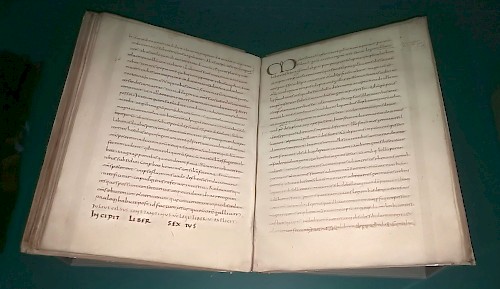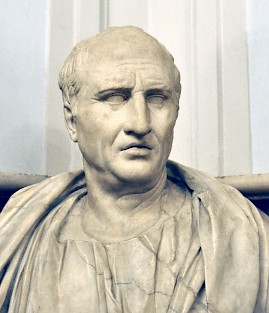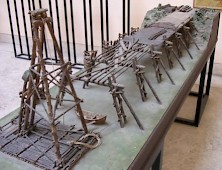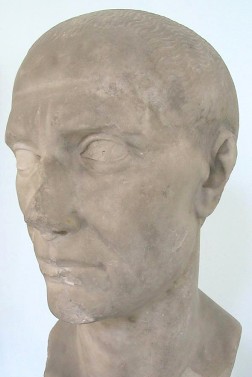Caesar's Gallic War
Caesar's Gallic War: Caesar's reports on his conquests in Gaul. The Roman senator Cicero thought it was a splendid text, and although we can recognize the book's bias, it still is a remarkably efficient piece of writing.
Introduction

Caesar's Gallic War consists of seven parts ("books"), each devoted to one year of campaigning. The first book covers the year 58 BCE: it opens with the war against the Helvetians, continues with a victorious battle against a Germanic army, and culminates in the modest remark that Caesar had concluded two very important wars in a single campaign. In the next book, which deals with the year 57, we visit the Belgians, who lived way up north. Again, the book culminates in a triumphant note: when the Senate received Caesar's dispatches, the august body decreed a thanksgiving of fifteen days, "an honor which, until then, had been conferred on no one".
The next books cover campaigns along the shore of the Atlantic Ocean (Book Three), the invasions of Germany and Britain (Book Four) and the second invasion of Britain (Book Five). The sixth book offers descriptions of some hard fighting in the valley of the Meuse and a second invasion of Germany. Finally, the book dealing with the events in 52 BCE, is probably the most exciting one: it deals with the war against Vercingetorix. We read how the Roman lines of communication were almost cut off, about the siege of Bourges, about an unsuccessful attack on Gergovia, and finally about the siege of Alesia, which culminates in a remark about a thanksgiving of twenty days. (Book Eight, which describes mopping-up operations in 51 and 50, was later added by one of Caesar's colonels, Aulus Hirtius.)
The structure of the description of the siege of Alesia illustrates Caesar's method. If we are to believe him, the outcome of the war depended on one single siege. This may have been correct, but the fact that fighting continued for two more years suggests that things may have been more complex. The outcome of the siege was - according to Caesar - decided on one single day; during that day, one single fight really mattered; and that clash fight was decided by one man, Julius Caesar, who appeared on the scene when things were going wrong. In other words, it was Caesar who personally won the fight, the battle, and the war. This is splendid propaganda.
Stylistic Brilliance

For centuries, the Gallic War has been the first real Latin text, written by a real Roman, for children who were trying to master the ancient language. Caesar's language is not very difficult indeed. Cicero says:
The Gallic War is splendid. It is bare, straight and handsome, stripped of rhetorical ornament like an athlete of his clothes. … There is nothing in a history more attractive than clean and lucid brevity.note
But the general was not just writing for Cicero and other senators, who recognized Caesar's artful simplicity. In the Roman political arena, Caesar belonged to the populares, who sought legitimacy through the Popular Assembly. (The other tactic was that of the optimates, who focused on the Senate.) Although every Roman citizen had a right to vote in the assemblies, in fact only the urban citizens had an opportunity to do so. For Caesar, it was important to impress the craftsmen and wage workers, and the Gallic War was written for them as well. We must imagine that Caesar's half-literate adherents read his annual dispatches to their fellow-Romans.
Still, the simplicity of his style does not exclude dazzling phrases. The following quote, the longest sentence from the Gallic War, is one single period, which evokes the chaos during the Battle of the Sabis, in which Caesar overcame the Nervians. As usual, he speaks about himself in the third person, a trick to make the text look more objective.
When Caesar, who had addressed the tenth legion, reached the right wing, he found his troops under severe pressure and, because all the standards of the twelfth had had been collected into one cramped space, the soldiers packed so close together that they got in each other's way as they fought, while all the centurions of the fourth cohort had been killed - together with the standard bearer: the standard was lost - and those of the other cohorts as well, including the very brave senior centurion, Publius Sextius Baculus, who had so many terrible wounds that he could no longer stand, and when Caesar saw that the rest of the men were slowing down, and some in the rear ranks had given up fighting and were intent on getting out of range of the enemy, while the enemy in front kept pouring up the hill and were pressing us on both flanks, he recognized that this was a crisis because there were no reserves available, so he snatched a shield from a soldier in the rear ranks - Caesar had no shield with him - and went forward to the front line, where he called out to all the centurions by name and shouted encouragement to the rest of the men, whom he ordered to advance and to open out their ranks so that they could use their swords more effectively.note
It is easy to understand why this sentence is, in most modern translations, divided into three units. However, the chaos of the battle is evoked better if an experienced reader reads these words to his audience in one breath. When the reader runs out of breath, he has reached the climax: Caesar personally intervening and saving the day.
Meanwhile, a more sober analysis of the battle shows that it was not Caesar, but his colonel Titus Labienus who acted decisively. That Caesar in his account of the Battle of the Sabis gives all credit to himself, is unusual: under normal circumstances, he also mentions and praises his colonels and soldiers. Many of them were well-known in Rome and were popular with the masses. Others, like Quintus Cicero and Publius Licinius Crassus, were relatives of well-known senators, who certainly appreciated that their nephews or sons were mentioned.
A Political Geography
It would be exaggerated to say that for the Romans Gaul was terra incognita. Italian merchants and Roman commanders had already visited the valleys of the Rhône and Saône, and Gallic traders had told stories about the territories north and west of Lyon. However, the countries along the Ocean were poorly known. The description of the shores of Gaul by the Greek sailor Pytheas, almost three centuries old, was probably the best there was, and it was probably known only second-hand. Another source was Xenophon of Lampsacus, who believed that up north, one would find people with horses' hooves or ears of an extraordinary size. On the Birds Islands, Xenophon said, people lived on oats and eggs.note
Inevitably, Caesar makes geographical mistakes. When he states that "the Meuse rises in the Vosges mountains, passes along the island of the Batavians, and flows into the Rhine about 80 miles from the sea",note he confuses the river with the Moselle, which has its sources in the Vosges. He follows Xenophon when he states that the people along the Rhine have a diet of fish and eggs.note
Other mistakes are intentional. Caesar knew that people at home had the most fantastic ideas about the edges of the earth, and he carefully exploited these prejudices. The ancients believed that if you left the Mediterranean and moved inland, you would reach increasingly barbarous people, until, when you reached the Ocean at the edge of the world, where ebb and flood occur, the land was inhabited by absolute savages. They lacked civilization, but were extremely brave. Take the famous opening lines of the Gallic War:
Gaul as a whole consists of three separate parts: one is inhabited by the Belgae, another by the Aquitani and the third by the people we call Gauls, though in their own language they are called Celts. … Of all these peoples, the toughest are the Belgae. They are the farthest away from the civilized ways of the Roman province, and merchants, bringing those things that tend to make men soft, very seldom reach them; moreover, they are very close to the Germans across the Rhine and are continually at war with them.note
The Roman province, the Gauls, the Belgae, the Germans: there is an increase of savagery, and Caesar never ceases to remind his audience of the country he was fighting in. The Ocean shores are often mentioned, even when there is no need to. In an account of an expedition against the Eburones, who lived in the east of modern Belgium, he mentions that some people "fled to the islands that are cut off from the mainland by the high tide".note This cannot be true. Paleogeologic studies of the Belgian and Dutch coastal area have shown that the Zeeland archipelago did not yet exist; the nearest islands were those along the Wadden Sea, more than 300 km away. Still, Caesar seized an opportunity to remind his readers that he was fighting at the edge of the earth, in a barbarous country, against dangerous savages.
The most interesting aspect of his geography is the way he defines his theater of operations: the Rhine is the eastern border of Gaul. He must have known that this is incorrect. The region of the Celtic states continued east of the river, along the Danube, all the way to Bohemia. The language of the Belgae was spoken as far as east as the Ems. Germanic migrants had in Caesar's time settled west of the river. Whatever the Rhine may have been, it was not a border between Celts and Germans.
Cover-up
Caesar's books were intended as an aid for future historians - that's why they are officially called Commentaries, and not History of the Gallic War - but the author often leaves out information that historians would have found interesting. In his continuation of the Gallic War, Hirtius mentions unsuccessful Roman actions and cruel executions of defeated enemies - information that Caesar, in the seven first books, had repressed. There are no accounts of the looting of the Gallic sanctuaries, which are known to have taken place, nor is there any reference to the sale of POWs. The latter can be explained: if a general sold people into slavery, the Senate received a share of the proceeds. By writing that these people had been killed, Caesar could keep the money himself.

Sometimes, lack of success was too well known in Rome to be ignored. Caesar explains his setback at Gergovia by blaming his soldiers, who had been over-eager to attack. On other occasions, an ethnographic digression helps to cover up things. In 6.9-10, Caesar's men build a bridge across the Rhine, and the reader is prepared for the invasion of the country on the east bank. Sections 11-28 are devoted to the customs of the Germans, and in 6.29, we learn that Caesar's enemies, the Suebians, had retreated, so that the legions could return. There is not a word about the campaign, which was obviously a disaster.
As it happens, we know what really happened, because the Greek historian Cassius Dio, a really independent mind and a clever historian, states that Caesar accomplished nothing and retired rapidly out of fear for the Suebians.note In other words, the exact opposite of what Caesar claims that had happened. Dio also gives a description of a Roman attack on a refugee camp during an armistice that makes more sense than Caesar's own description of his fight against the Usipetes and Tencteri.note
A third occasion on which Dio offers information that Caesar preferred to hold back, is the siege of Alesia. After the decisive fight, the leaders of the besieged Gauls met, and Vercingetorix said that they ought to decide what to do. They sent envoys to Caesar, who demanded them to hand over their weapons, and waited on his throne for the enemy leaders to arrive. The tribal leaders came and handed over Vercingetorix. At least, this is what Caesar writes, stressing that the Gauls themselves abandoned their leader. But it is probably not what really happened: according to Dio, Vercingetorix remained in charge to the very last moment, and surprised Caesar by appearing unexpectedly.
Conclusion

Cicero may have appreciated Caesar's stylistic qualities, but when he compares the Gallic War to a work of history, he only proves that he is a victim of Caesar's superior literary skills. The books were an instrument to influence public opinion at home. Had it been a history of the conquest of Gaul, the book would at least have contained an explanation about the causes of the conflict, but Caesar never explains why he went to war at all.
However, although Caesar's bias is evident, this does not mean that the work has no value at all. The author concentrates on the military aspects of the war, and for the study of ancient warfare, the Gallic War remains one of the most important sources. On the other hand, one can never use his descriptions at face value.
Note
An earlier version of this article was published in Ancient Warfare, 2.4 (2008)